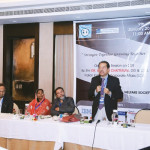Corporate Social Responsibility is not merely donation for a social cause or one-off affair. It is constant hand-holding between the Corporate body and an NGO.

Mr. Bhaskar Chatterjee of IICA addressing the CRS Orientation programme by Raza Education and Social Welfare Society.
By A Staff Writer
Bengaluru: The Raza Educational and Social Welfare Society held an orientation programme for NGOs on Corporate Social Responsibility (CSR) in the City on January 8. Nearly 150 representatives of various civil society organisations participated. Director General and CEO of the Indian Institute of Corporate Affairs (IICA) introduced the CSR to the audience.
We reproduce below the proceedings for the benefit of the Islamic Voice readers:
What is CSR? As per the new Indian Companies Act 2013, a company that has a net worth of Rs. 500 crore, an annual turnover of up to Rs. 1,000 crore and annual profit of Rs. 5 crore, should spend two per cent of the “Average Net Profits of the block of previous three years on CSR activities. The amount has to be channelised through registered NGOs for purposes like poverty alleviation, improving the quality of life, better healthcare or beneficial programmes like improvement of the environment or any other recognised effort to take the society towards better standards of life.
What does it mean? Corporate Social Responsibility is a form of corporate self-regulation integrated into a business model to further social good, beyond the interests of the firm and that which is required by the law. A company can choose an NGO (or voluntary organisation that is imparting literacy, providing education to adult illiterates, imparting skills to household women, rejuvenating village ponds and lakes, planting trees, coaching underprivileged students for competitive exams, organising village artisans, restoring old monuments, helping villagers build a house, providing solar lanterns to rural students in un-electrified homes, installing solar panels in rural homes, etc.) to donate its profits.
How to do it? The companies will have to start with an end in mind and should have clarity about the project, have trust in its functionaries, should be well aware of the credibility and track record of the voluntary work and the organisation, should prepare a detailed project, should monitor the project at each stage through a professional and evaluate the result at the end.
CSR Potential in India: There are eleven lakh companies in India. Of these, 30,000 come under the CSR i.e., annual turnover of Rs. 1,000.
How it helps? Corporates need not go to the field to carry out social work. CSR enables the Corporates and civil society organisations to operate with synergistic cooperation. It is not merely donation for a social cause or one-off affair. It is constant hand-holding between the Corporate body and an NGO. At every level, the expertise of professionals is involved. The Project Report charts the trajectory. It documents the conditions prior to taking up the project and post-operations and builds up visual record. The professionals decide as to where each rupee would go, at what time and for what, and how it would bring about change.
Any courses in this regard? The Indian Institute for Corporate Affairs (IICA) runs a 9-month online certificate course. The fee is Rs. one lakh for the entire 9-month course. The fee can be paid in three instalments. Corporates can sponsor the candidates. For details log on to: www.iica.in.
Ms. Benazeer Baig, secretary of the Raza Education and Social Welfare Society introduced the Excellent School which educates children rescued from child labour sites and workshops and said they had instead started providing skill development programme for the mothers of these children. The Society is being helped by several corporates such as Tech Mahindra, etc.
Mr. Syed Mohammad Beary, Chairman, Bearys Group narrated his ascent from a humble origin in a coastal village of Karnataka into a successful realtor, builder and developer who channelizes the profits from his enterprise to a group of 32 educational institutions which include an engineering college. Maqbool Ahmed Siraj, journalist and advisor of the Society conducted the programme. An open session followed after the orientation programme. Representatives of nearly a hundred NGOs participated in the programme.

COMMENTS